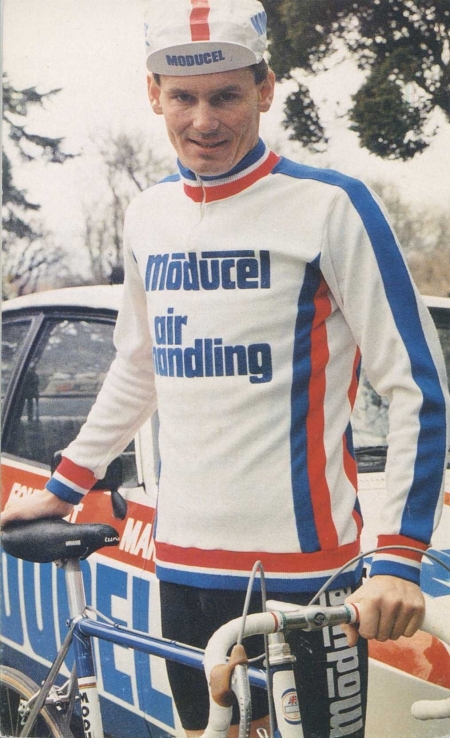
It’s the stuff of cycling folklore; the year was 1987 and a British trade team lined up in Berlin for the start of the world’s biggest bike race.
ANC-Halfords was the name on the jersey; against such mighty opposition as Carrera, Del Tongo, Panasonic and Z-Peugeot.
A scarcely believable accomplishment which would take 23 years to repeat when Team Sky took to the start in Rotterdam in 2010.
The visionary/villain behind this adventure was an ex-policeman turned taxi driver turned parcels delivery entrepreneur – ANC stood for Associated National Couriers – called Tony Capper.
He’s sadly no longer with us – but what I’d give to have interviewed that man.
But how come a chain-smoking, grossly overweight man who hadn’t even heard of bike racing until a couple of years before could pull off such a feat?
And just as importantly, from which exotic flora did the seed of this gargantuan idea fall from?
Enter our man of the day, Mr. Michael Morrison, aka Mickey Morrison.
Morrison was a good amateur rider in the UK in the 70’s with a raft of wins and placings in UK races, an excellent climber he was King of the Mountains in the always hard fought and far from flat Girvan Three Day race, held over the Easter weekend, usually in grim weather conditions.
Morrison’s rides caught the eye of the British Cycling Federation selectors and he was short listed for the 1980 Moscow Olympics.
But he didn’t ‘make the cut’ and that’s where our story begins of a man who brought major sponsors into UK cycling but who’s contribution is largely forgotten:
“There were 15 riders on the short list for the Moscow Olympics but only six made the trip.
“I did an interview with my local paper, the theme of which was that my Olympic dream was over and I was going to turn professional – the Olympics were a strictly amateur affair back then.
“The next thing I know, I’m contacted by a friend of my late father who had read the article and wanted to know what was involved with sponsoring a professional bike rider.
“He was a good guy, a chap called Michael How, a real ‘Potteries Man’ [the Staffordshire Potteries is an area of six towns, famous for ceramic production and work ethic. ed] who owned an air conditioning company called ‘Moducel.’
“I explained that I would be like a representative for his company, traveling in a Moducel liveried car all over the UK and racing in the company livery with the media reporting on my performances if I did well.
“I said I’d need a salary of £2,500, a car and whilst I could organise bike and clothing sponsorship, I’d need money for tyres and equipment.
“He sent me to meet his man, John Wilshaw, I sold myself and I was a pro for season 1980.”
Mickey Morrison performed well in the Moducel colours despite being a lone pro against small but strong teams like MAN-VW-Viking, Elswick-Falcon and Weinmann.
Over the 1980 and next three seasons, Morrison added to the roster – quality riders Dudley Hayton, Phil Corley and Steve Joughin all sported the red, white and blue of Moducel.
But as televised city centre races arrived in the UK and Morrison placed well in these he began to think that he was worth more than the £2,500 per annum salary he was drawing from Moducel.
He explains;
“I reckoned I was worth £6,000 plus car and bikes. I approached a friend of mine, Malcolm Roche who had a garage and asked him if he’d be interested in sponsoring me.
“He said ‘no’ but suggested that I speak to a guy he’d had in and had bought a number of vans for his parcel delivery company.
“I contacted the guy, put together a portfolio with press cutting and videos and went to see him.
“Halfway through the pitch he said; “OK, that’s enough, I’ll take you on at £6,000 salary, a car and bike – and I want you in two mornings each week to work with my marketing committee.”
“As I was walking out he said to me; “what are the bike biggest events in the UK and in Europe?”
“I explained about the The Sealink International, The Milk Race and Kellogg’s Tour of Britain; and then on the continent there were the Classics and Grand Tours, with the biggest being the Tour de France; but a British team hadn’t ridden there since 1968 – and that was a national team.
“He replied; “right, we’ll win the Sealink, Kellogg’s race and that Milk Race in England, that won’t be too difficult; then get into those Classics in Europe, do well there and that’ll get us into the Tour de France.”
“Here’s a guy who hadn’t even heard of professional cycling half an hour before telling me he’s going to put a team in the Tour de France!
I thought, ‘this guy’s on magic mushrooms!’
“But Tony Capper had vision and he achieved all of those objectives – Joey McLoughlin won the Sealink and Kellogg’s Tour and Joey and then Malcolm Elliott won the Milk Race.
“Malcolm was third in the Amstel Gold classic, Adrian Timmis won a stage in the Midi Libre, a Tour ‘preparation race’ and the team got the green light for the Tour…”
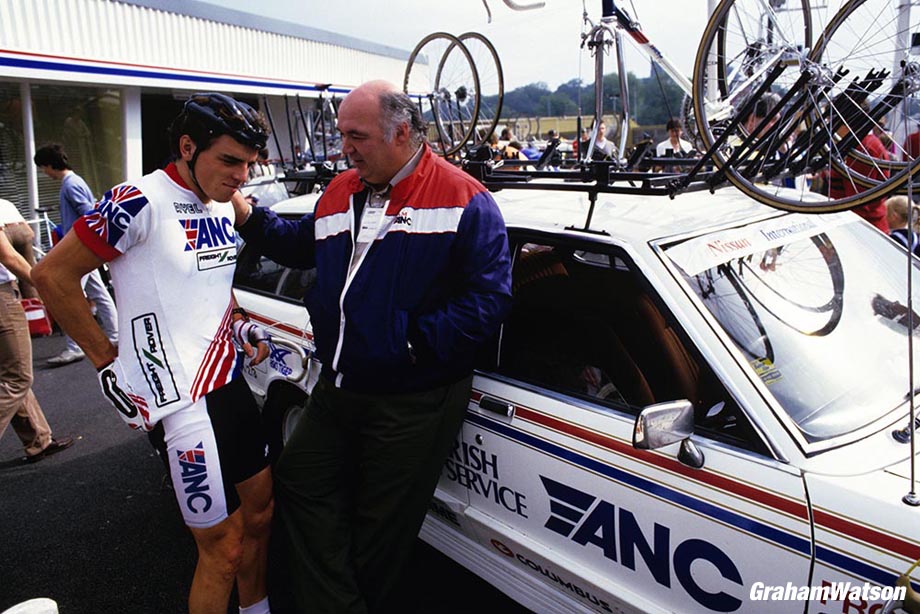
Mickey Morrison explains how the talented McLoughlin – who would go on to ride for Z-Peugeot but was a rider who never fully realised his huge potential, despite the wins noted above – came to be on the team.
“Phil Thomas was on the ANC squad and he told Tony Capper about his brother-in-law was a talented young lad on the ‘up’ – Joey.
“I had been promised a salary raise from £6,000 to £9,000 but Tony came to me and said; ‘I’ve used up all the salaries budget but if you would accept staying on £6,000 I could use the other £3,000 to take the McLoughlin lad on board.‘
“I agreed and that’s how we got Joey on the team.“
Morrison explains that the team also employed the services of a couple of Australian riders:
“Shane Sutton has been in the news lately; he rode the Tour de France for us in 1987 but in ’84 when he rode for Ever Ready he approached me and told me there was another good Aussie who I should sign, Neil Stephens – it was us who gave Neil his first pro contract.”
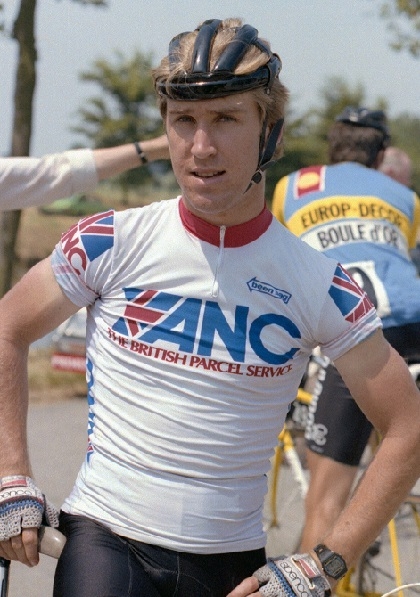
Stephens would go on to win the Australian road championship and a Tour de France stage as well as becoming a stalwart at Spanish ‘mega equipo’ ONCE.
One of the hurdles to clear for Capper to realise his ambitions was the six man limit imposed on UK team sizes by the Professional Cyclists Association.
Capper knew that he’d need a much bigger pool to draw upon to fulfil his continental dreams, the answer?
Start another team.
As usual, Mickey Morrison has the juice:
“Tony and I had a friend who owned a vehicle hire company called Interent – that was where I got my ANC team car – and for 1986 we had a second team under that banner with me, Nigel Bloor, Tim Harris and Jon Wainwright.
“But by now the organisational side was too much to handle and race so I had to say to Tony that I was giving myself over to the office and quitting racing, it was just too much to handle.”
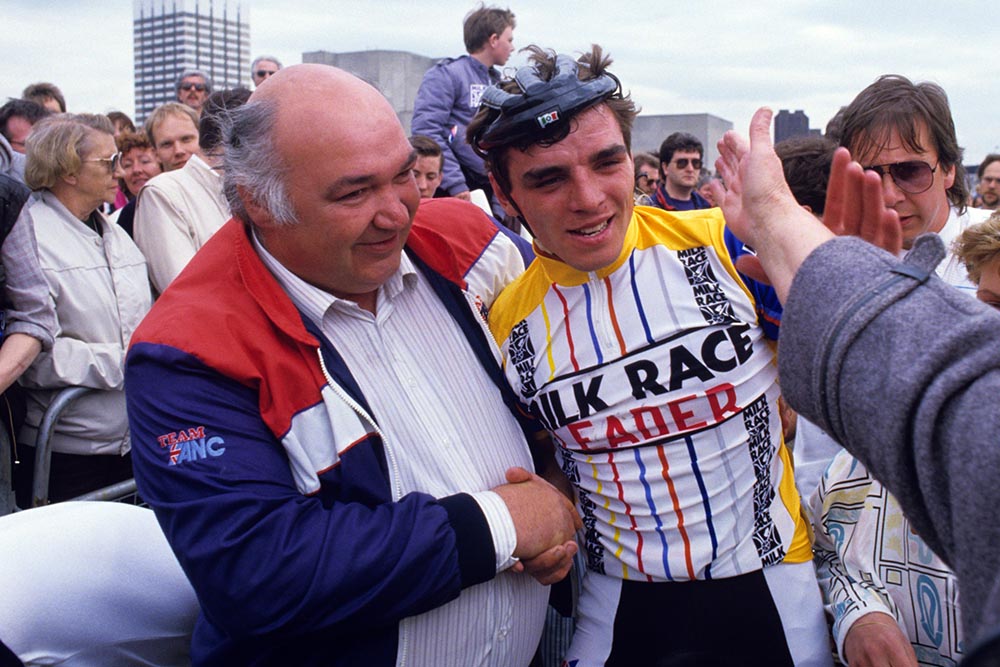
However, two teams still didn’t give Capper and his management team enough selection leeway, the answer was, yes, you’ve guessed, launch a third team…
“I got this phone call from a lady at LYCRA Dupont, I mean, I didn’t know who ‘Dupont’ were – just one of the biggest corporations in the world!
“Anyway, she’d seen pictures of Malcolm Elliott, who was a good looking lad and they wanted him to do a photo shoot in London.
“So Malcolm and I went down to London and at the shoot I met this Dupont guy who I knew from ‘back in the day,’ Peter Adcock who’d raced with Leicester Roads. We got to chatting and I told him about the plan for another team and two days later 30 grand was transferred direct to our bank account and we had the funding for our third team!”
The big year was 1987 and after riding the ASO early season races, the team had done enough to qualify as a ‘wild card’ for the greatest annual sporting event on earth.
Some say that the hard racing they put in to get to the Tour was where their Tour performances were left.
I asked Morrison if he wasn’t a bit peeved that he was stuck back in the ANC offices in the UK as the team battled it’s way around the hexagon of France?
“No, not at all, I had too much to do on the media side.“
And, of course we have to ask about the team ‘imploding’ during that race, with Capper leaving the race in the last week, never to be seen again, the four survivors stumbling in to Paris with nothing to show for it back in their bank accounts.
“Yeah, it’s sad but true, Tony should at least have spoken to everyone about what was happening.
“But the truth is that he’d gambled all on the ANC board (remember that he’d been bought out of the company) being impressed by the team’s performance in the Tour and they would pump in more cash, or else he’d pull other sponsors in – but those things didn’t happen and he simply ran out of money.
“The entry fee was £33,000 [we’ve seen it quoted elsewhere at £25,000 and £37,000, ed.] with £30,000 of that coming from Dupont who had their name on the Tour jerseys.
“But even with that money, he still ran out of funds – the thing that pissed me off was the two ‘directors’ he appointed to ‘Action Sports,’ the management company which ran the team – they did nowt but made sure they got their money and there was 50K of our budget gone.”
It’s easy to say that the team’s Tour was a debacle but as Morrison points out:
“Because they got a ride with ANC a lot of riders vaulted into pro careers with big squads, some did better than others; Malcolm Elliott went on to Fagor then Teka and Seur; Adrian Timmis and Joey McLoughlin signed for Z-Peugeot; Paul Watson got a ride with Hitachi.”
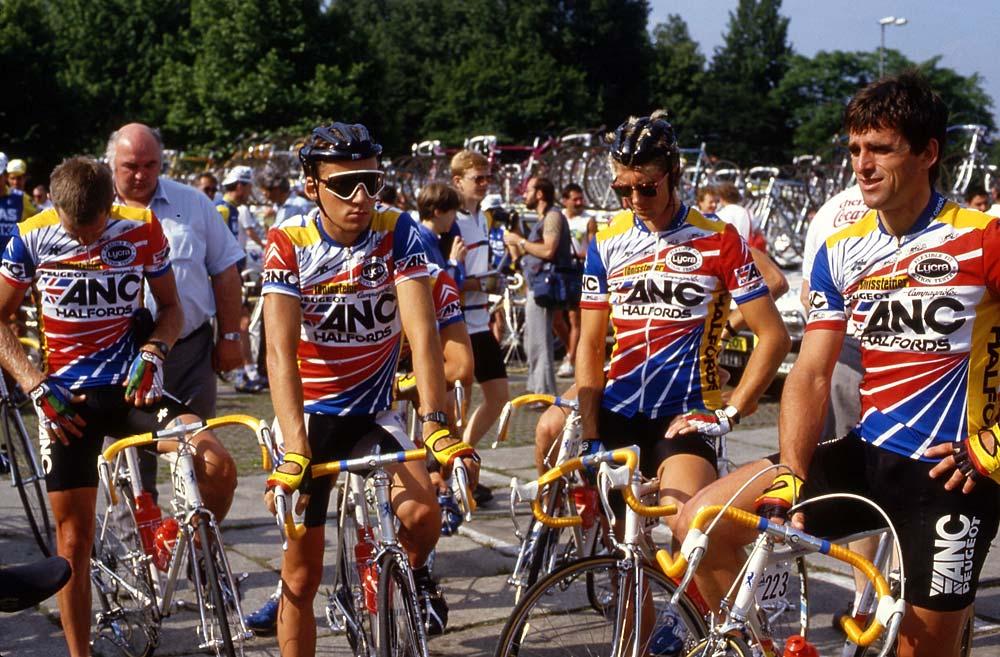
Morrison went on to work with the British Professional Cycling Association and before he was finished with the sport brought in another big sponsor: Ambrosia, manufacturers of dessert foods such as the cyclists’ favourite, ‘creamed rice,’ – among those who rode for him were a certain Rod Ellingworth, instrumental in the construction of the Team Sky/Ineos machine and now with the difficult task of re-booting Mark Cavendish at Bahrain.
And Worlds individual and team pursuit medallist, Rob Hayles; not mention Mark McKay, who now runs the performance side of Scottish Cycling.
Does Morrison have any regrets about his time in the King of Sports?’
“No, I’m one of those people who makes a decision then lives or dies by it !“
We thought not, with thanks to Mickey for a highly entertaining and informative interview.



